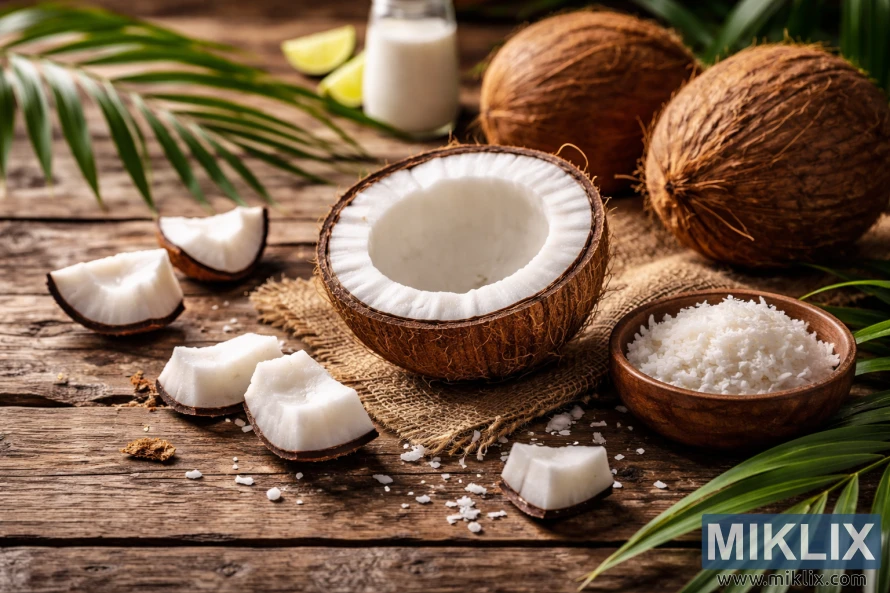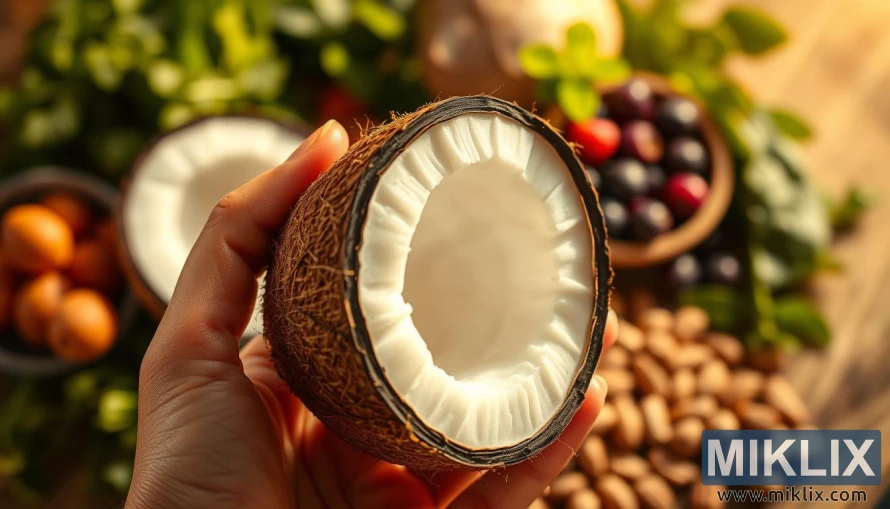Tropical Treasure: Unlocking the Healing Powers of Coconuts
Published: May 12, 2025 at 8:05:13 PM UTC
Last updated: December 26, 2025 at 11:13:25 AM UTC
Coconuts come from tropical areas and are from the coconut palm (Cocos nucifera). They are known for their health benefits and nutrition. Coconuts are full of nutrients and can be used in many ways in cooking. They taste great and are good for your health. This makes them a great choice for anyone looking to eat better. Coconuts are also used for medicine and as a sustainable material. They are important for both our health and the environment.

Key Takeaways
- Coconuts provide a rich source of essential nutrients.
- They offer various health benefits, supporting overall wellness.
- Coconut nutrition includes healthy fats and fiber.
- Uses of coconuts extend beyond food into medicinal and environmental realms.
- Incorporating more coconuts into meals can enhance flavor and nutrition.
Introduction to Coconuts
Coconuts are fascinating fruits from the coconut tree. They have three layers: the exocarp, mesocarp, and endocarp. This makes them similar to fruits like peaches. It takes about 11-12 months for them to mature, making them very versatile.
There are over 400 types of coconuts grown worldwide. They love warm places, like the Caribbean and Southeast Asia. People call them the "tree of life" because they're so important. Every part of the coconut palm is useful, from water to wood.
Nutritional Profile of Coconuts
Coconuts are special because of their unique nutritional content. They are full of healthy fats, like medium-chain triglycerides (MCTs). These fats give energy and help with metabolic health. A cup of fresh shredded coconut has about 283 calories and 26.8 grams of fat.
They also have 7.2 grams of fiber, which is good for your digestive health. Shredded coconut has about 7.2 grams of carbs per cup. It has very little sugar, making it good for many diets. Coconuts also have minerals like manganese, copper, and selenium, adding to their nutritional value.
Coconuts offer many health benefits, making them great for a balanced diet. You can add them to smoothies, salads, or baked goods. They bring flavor and nutrition to any meal.
Health Benefits of Coconuts
Coconuts offer many health benefits that are key to staying well. They are full of fiber and healthy fats, which help with weight control. These fats also boost energy during workouts.
Coconuts help with digestion by preventing constipation and keeping bowel movements regular. They also support the immune system and reduce inflammation. Plus, they can improve oral health thanks to their antimicrobial properties.
It's important to eat coconuts in moderation because they are high in calories. Being careful with portion sizes helps keep your diet balanced. Enjoying coconuts in a mindful way lets you benefit from their nutrients while watching your calorie intake.

Antioxidant Properties of Coconuts
Coconuts are packed with coconut antioxidants, which are great for your health. These antioxidants, like phenolic compounds, fight free radicals in your body. They help protect you from chronic diseases by reducing oxidative stress.
Eating coconuts can boost your cellular health and lower DNA damage. This makes coconuts a key part of a healthy diet. They not only taste good but also keep you healthy with their antioxidants.
Coconuts: A Natural Antibacterial
Coconuts are getting more attention for their antibacterial powers. They are becoming a key part of healthy diets. Studies show that coconut oil can stop harmful bacteria like Staphylococcus aureus and Streptococcus mutans from growing.
This means coconut oil could help keep your mouth clean and prevent infections. It's a natural way to boost your oral health.
Oil pulling with coconut oil is a natural way to clean your mouth. It uses the antibacterial powers of coconuts. People say it makes their breath smell better and their gums healthier.
Blood Sugar Control with Coconuts
Coconuts and blood sugar control have a promising link, mainly for those with diabetes. They are low in carbs and high in fiber. This makes them great for keeping blood sugar stable, which is key for those watching their sugar intake.
Studies show that adding coconut oil to meals can help control blood sugar and lower triglycerides. These results are promising. But, more research is needed to understand how coconuts affect blood sugar over time.

Healthy Fats in Coconuts
Coconuts are packed with coconut fats, mainly medium-chain triglycerides (MCTs). These fats are broken down differently than others, bringing health perks. They give quick energy, which is why athletes and those wanting to boost endurance love them.
Studies show MCTs in coconuts might help with weight control. They make you feel full, reducing the urge to overeat. They also seem to improve brain function, helping with mental focus.
But, the high saturated fat content in coconuts sparks debate. Health groups often suggest eating coconut oil in moderation. They stress the need for a balanced diet. Enjoying the good fats in coconuts while watching overall fat intake can be key to a healthy life.
Hydration Benefits of Coconut Water
Coconut water is a popular choice for staying hydrated, perfect for hot summer days. It's packed with important electrolytes like potassium and magnesium. These help keep our bodies balanced and hydrated.
It's also a hit among athletes looking for a better way to rehydrate after working out. Unlike sugary sports drinks, coconut water is low in calories and sugars. Drinking it after exercise can help replace lost fluids and nutrients.
- Natural source of electrolytes
- Low in calories and sugars
- Helps replenish hydration levels
- Great choice for post-workout recovery
Even though coconut water is great for staying hydrated, it's not perfect. It has some sodium, which might not be enough for full rehydration. Yet, adding it to your diet can really boost your hydration efforts. It's a tasty way to enjoy the benefits of coconut water.
Culinary Uses of Coconuts
Coconuts are a treasure in the kitchen, bringing a variety of flavors to the table. They are used in coconut milk and cream, which are key in Asian and Caribbean dishes. Coconut flour is also popular for gluten-free baking.
Their nutty, sweet taste makes coconut recipes a hit with everyone. This makes them a favorite in many homes.
Coconut oil is another favorite, used for cooking and baking. It adds health benefits to our meals. Dried coconut flakes add texture and a tropical flavor to both sweet and savory dishes.
- Coconut milk enhances soups and curries.
- Coconut cream creates delicious desserts.
- Coconut flour serves as a gluten-free alternative in baking.
- Coconut oil is a versatile cooking fat.
- Dried coconut flakes add a tropical touch to granola and snacks.
Potential Drawbacks of Coconuts
Coconuts have many health benefits, but they also have some drawbacks. One major concern is their high calorie and saturated fat content. Eating too much could lead to weight gain, so it's important to watch how much you eat.
If you have health issues like high cholesterol or heart disease, talk to a doctor before eating coconuts. Adding them to your diet without advice could be risky.
Also, some people might be allergic to coconuts. This is rare but can cause health problems. It's important to know if you have any bad reactions and to be careful when trying coconut products.
How to Incorporate More Coconuts into Your Diet
Adding coconuts to your meals can be fun and healthy. You can make your recipes better or try new tastes. Using fresh coconut meat in smoothies makes them creamy and tropical.
For baking or gluten-free dishes, try coconut flour. It adds a nice coconut taste and nutrients. Coconut milk is great in curries and soups, adding richness without losing health benefits.
Toasting coconut flakes makes a tasty snack. Add them to yogurt or salads for extra crunch. Remember to watch calories to keep your diet balanced. These tips can make cooking more enjoyable and healthy.
Environmental Impact of Coconut Cultivation
Coconut farming is key in both local and global environments. It gives jobs and food in tropical areas, showing its value in many economies. But, the harm from coconut farming can't be ignored. Bad farming ways often cause forests to disappear, harming animals and plants.

To lessen these harms, we must push for sustainable coconut farming. Supporting good farming practices helps keep nature's resources safe and healthy. Old farming ways that focus on growing many plants together and trees can help keep nature balanced while helping local people.
With more people wanting coconuts, knowing the environmental effects is vital. Everyone needs to work together to make coconut farming better. This way, we can enjoy the good things about coconut farming without hurting our planet.
Global Popularity of Coconuts
Coconuts have become very popular around the world. They are now key in many foods and health routines. This is because people know they are good for you.
In the U.S., coconut water, oil, and milk are now common. They are seen as healthier choices for our diets.
Coconuts are not just for eating. They are also big in beauty products. Coconut oil is loved for its moisturizing effects. People want natural and organic products, and coconuts fit the bill.
Today, more and more people want coconuts. The U.S. is leading the way, using coconuts in new and exciting ways. As we focus on health, our love for coconuts will only grow. This is making food brands create more coconut-based products.
Conclusion
Adding coconuts to your diet can bring many health benefits. They help with weight management and blood sugar control. Coconuts are full of nutrients and keep you hydrated.
But, it's important to remember that coconuts have a lot of calories and saturated fat. Eating them in small amounts helps keep your diet balanced. As more people discover coconuts, they will stay a favorite in kitchens everywhere.
Enjoying coconut water or adding shredded coconut to your meals can boost your health. This journey with coconuts not only tastes great but also improves your well-being in many ways.

Further Reading
If you enjoyed this post, you may also like these suggestions:
- Spice Up Your Life: How Chili Boosts Your Body and Brain
- Spoonfuls of Wellness: The Yogurt Advantage
- From Collagen Booster to Brain Calmer: The Full-Body Benefits of Glycine Supplements
